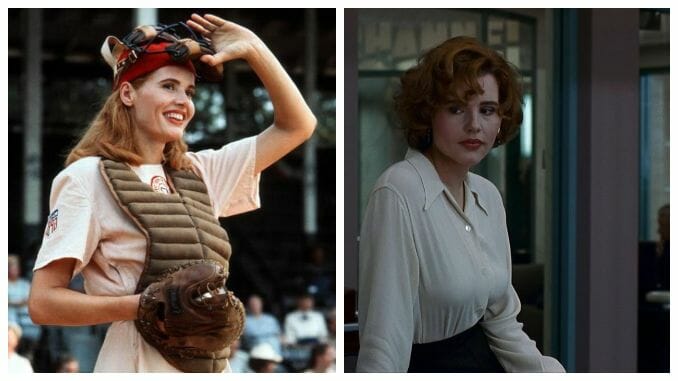Geena Davis’ Retro Movie Star Talents Shone Brightest in A League of Their Own and Hero

“I know the goods when I see the goods, and she’s the goods.” That’s what a baseball scout tells Kit (Lori Petty), a scrappy underdog ballplayer in the 1940s. He’s talking about Kit’s older sister Dottie (Geena Davis), a better ballplayer with an even temper who is better-loved by their parents and, by general consensus, prettier and more put-together than her sibling. It’s odd to consider, 30 years later, that Dottie is the principal heroine and point-of-view character for A League of Their Own. Kit seems like the more natural choice; she vibrates with relatable want, while levelheaded Dottie doesn’t struggle much with her natural abilities.
Casting a movie star as Dottie and turning her into the lead should make matters worse: On paper, this is a character who seems tailor-made to communicate the rarified movie-star experience of being the most talented, lovable and modest person in the room. If Dottie avoids that trap, it’s not for lack of glamor: Davis, with shining hair and occasionally, elegantly smudged cheekbones, looks poised even when she’s dueling over batting signals with her lush of a team manager, Jimmy Dugan (Tom Hanks). By all rights, Kit’s resentments should be our own.
Somehow, Dottie isn’t an insufferable character, or even an unlikable one, and a lot of that hangs on Davis’ performance. She makes it clear how Dottie’s sense of propriety—so maddening to Kit—is a crucial shield, keeping baseball from breaking up the marriage and future family she also desires. It’s a tricky, bittersweet portrait of subsumed passion that finds the nuance in Penny Marshall’s broader comedy of smart-mouthed scouts and quirky, single-trait teammates. Marshall directed A League of Their Own into a winning crowdpleaser; Davis made it feel like an old classic even before it turned into one.
Similarly, 1992 has morphed from a throwback year for Davis into one worthy of nostalgia; in retrospect, it was maybe her last year as a top-tier star. Coming off an Oscar nomination earlier that year (and a win a few years before that), she toplined League, a major hit set in the 1940s; and Hero, a major flop with a ‘40s sensibility. Hero has her playing Gayle Gayley, another woman at the top of her field, this one thrown into a Frank Capra-style dual assignment: Getting a story and falling in love. When her flight goes down in the middle of a city, she’s saved by local lowlife Bernie LaPlante (Dustin Hoffman); through an unlikely series of events, gentle homeless man John Bubber (Andy Garcia) takes the credit and, through her coverage, Gayle falls for him.
Hero doesn’t quite turn Geena Davis into the neo-screwball heroine of our dreams; the movie is more interested in imitating Capra’s Meet John Doe than his It Happened One Night or Howard Hawks’ His Girl Friday. Davis projects the intelligence of a fast-talking career gal, but the movie cedes most of its comedy to Hoffman—which leaves Davis to, again, navigate the tricky emotional center of an old-fashioned picture, wondering (from a different angle) whether the profession she loves may be interfering with the rest of her life. What’s so striking about Davis in both of her 1992 movies is how casually, elegantly and sincerely she’s able to play characters who are supposed to be more or less the best, without a hint of self-aggrandizement.
-

-

-

-

-

-

-

-

-

-

-

-

-

-

-

-

-

-

-

-

-

-

-

-

-

-

-

-

-

-

-

-

-

-

-

-

-

-

-

-








































